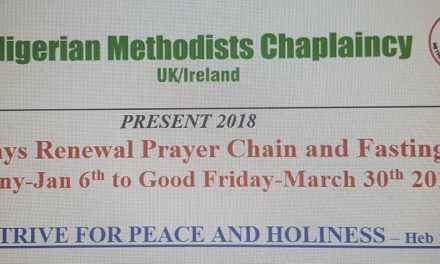John the Baptist in practice stepped aside, decrease so that Jesus might step up and increase in God’s mission and purpose. The reflection is, what might have happened had John not stepped aside for Jesus is happening in our churches today —a power struggle, competing teachers and disciples, and a prevention of many disciples from coming to Jesus. In essence, ‘“He must increase, but I must decrease” is the thought of each passing generation of God’s leaders who are looking to the future of Christ’s cause.’ We have good examples and models of leaders who acknowledged that Jesus must increase, and they must decrease. John Wesley reminds and invites us to’… know how to set, as well as how to rise; and let it comfort our declining days to trace, in those who are likely to succeed us in our work, the openings of yet greater usefulness.’ It was the thought of John Wesley preparing John Fletcher, just as ‘Moses preparing Joshua, and David preparing Solomon, and Paul preparing Timothy and Titus.’
John Fletcher born in Switzerland, grew up speaking French and settled in England where he helped shape the world. He moved to England at age 22, where John Wesley became his spiritual guide. He later became ‘the successor chosen by John Wesley to lead the Methodist movement into the 19th century.’ Wesley in his letter to Fletcher said, “Come while I am able, God assisting to build you up in faith, to ripen your gifts, and introduce you to the people!” “He must increase, I must decrease” mindset takes the grace of God to obey because the need for a new generation to take the reins of leadership in God’s work does not ‘means that relinquishing those reins is easy for a generation accustomed to them!’ “He must increase and, I must decrease” historic and missional relationship between Wesley and Fletcher and their Transfiguring legacy provides us valuable leadership and mentoring lessons today. Wesley said in his journal: “Mr. Fletcher helped me again. How wonderful are the ways of God! When my bodily strength failed, and none in England were able and willing to assist me, He sent me help from the mountains of Switzerland; and a help meet for me in every respect: where could I have found such another?”
It takes humility for us under the seductions of today’s culture to say as Wesley, as Moses, as David and as Paul ‘that we are not as important as the fate of a local church, or the development of leaders in worship and preaching, or the confidence of young believers.’ The reflection is that ‘the increase of Christ subdues the savage in man’s breast, make marriage honourable, child-life happy, elevates woman, liberates the slave, provides refuges for the homeless, etc.’ Beloved “He must increase, but I must decrease” reflects a mindset of complete humility in the face of one greater.
Transfiguring Lent summons us to avoid prideful boasting and arrogant bragging. Transfiguring Lent reminds us how ‘Nebuchadnezzar boasted about his great Babylon (Daniel 4:40) and the Lord judged him (vv. 41). Goliath boasted of his strength and power (1 Samuel 17) and the Lord removed him (v. 50). The Pharisee in the temple boasted of his righteousness and was not justified by God (Luke 18:10-14). God hates prideful boasting!’ Boasting was to be one of the characteristics of the difficult times of the last days and it continue to be one of the powerful and destructive seductions of today’s culture (2 Timothy 3:1-2). Transfiguring Lent points us to Paul’s exhortation. Paul is saying to you and I, “Let us not become boastful, challenging one another, envying one another” (Galatians 5:26).
“Boastful” are “worthy of death” (Romans 1:30, 32). O Lord, grant me a spirit of humility that recognises my own limitations, failures, and need of God’s grace—and be willing to renounce all expressions of boasting and bragging in Jesus name.











Recent Comments